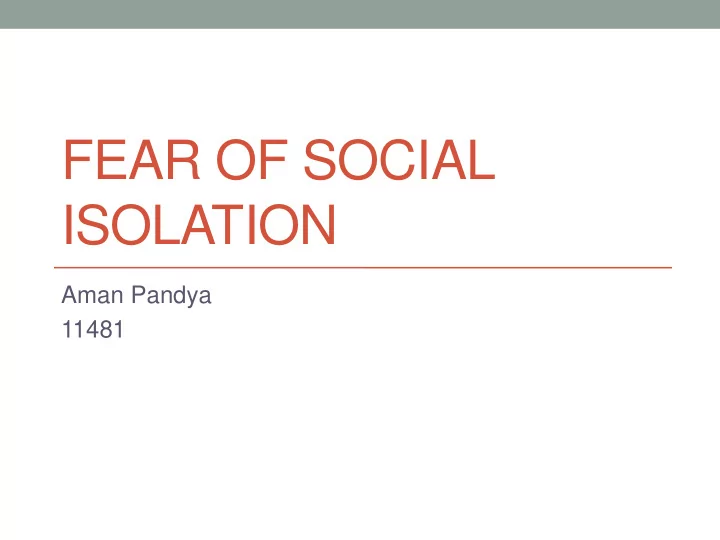

FEAR OF SOCIAL ISOLATION Aman Pandya 11481
• A modified version of social isolation experiment by Shoemaker, Breen and Stamper. • Experiment mainly to test an assumption from the Spiral of Silence theory by Elisabeth Noelle-Neumann
Spiral of Silence • Directly inspired from the work of Solomon Asch. • Introduced the concept of fear of social isolation. • „Social nature‟ of humans cited as the prime reason of fear.
Social Anxiety • Connection between self consciousness and a fear of being negatively evaluated by others – Monfries and Kafer (1994). • Two types of self consciousness – public and private. • Public self consciousness closest to fear of isolation. • “Fear of loss of social approval identical to FNE”
Hypotheses • The more a person fears negative evaluation, the less discrepancy there will be between the person‟s opinion and perception of the predominant opinion. • The more a person fears negative evaluation, the less likely he or she will be to discuss a minority opinion.
Method • Participants would be required to fill 2 survey forms. • First will measure opinion variables. • Second would assess fear of negative evaluation variables. • Pearson correlational coefficients used to relate the opinions.
Expected Results • Minimal discrepancy between individual opinion and perceived dominant opinion. • Greater the FNE, lesser will be the tendency to voice minority opinion. • Gender variations in FNE.
References • Shoemaker, Breen and Stamper. „Fear of Social Isolation: Testing an assumption from the Spiral of Silence‟, Irish Communications Review, Vol 8, 2000. • Elisabeth Noelle-Neumann, „The Spiral of Silence: Public Opinion - Our Social Skin‟. • Asch, S.E. (1951) „Effects of group pressure upon the modification and distortion of judgements‟. • Asch, S.E. (1952) „Group forces in modification and distortion of judgements‟. • Watson, D. & Friend, R. (1969) „Measurement of social evaluative anxiety ‟.
THANK YOU Questions?
Extra Slides
Expected Response
Opinion Survey • Individual opinion: Should the option of euthanasia be legally provided? • Perception of the predominant opinion: Thinking about the people you normally socialize with, what would be their opinion on the subject? • Willingness to express individual opinion: If you were at a social gathering and people there were discussing the mentioned issue, how likely would you be to enter the conversation if views are different from your own?
FNE Survey • I worry about seeming foolish to others. • I worry about what people think of me even when I know it doesn‟t make any difference. • I become tense and jittery if I know someone is sizing me up. • Other people‟s opinion of me does not bother me. (Reverse coded) • When I am talking to someone, I worry about what they may be thinking of me. • I often worry that people who are important to me won‟t think very much of me.
Pearson Correlation Coefficient
Recommend
More recommend